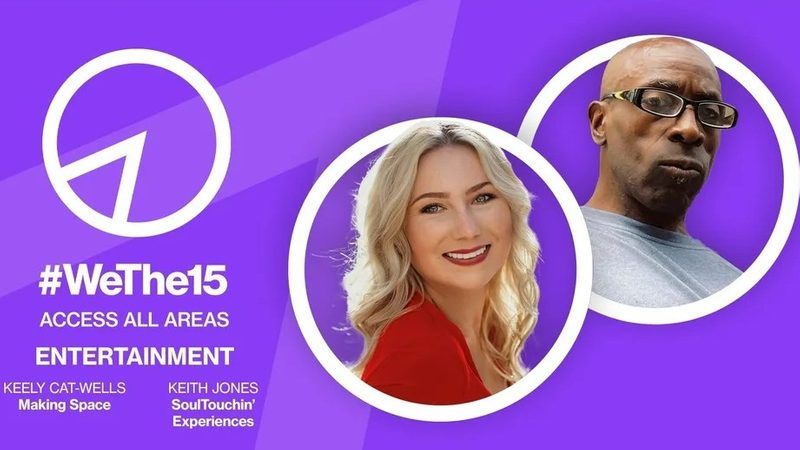
Ⓒ WeThe15, A purple graphic with white border and WeThe15 logo. It shows pictures of a black man with glasses and a white women inside circles. It reads '#WeThe15 Access All Areas, Entertainment; Keely Cat-Wells, Making Space, & Keith Jones, SoulTrippin' Experiences'.'
- ":1,"335559685":360,"335559991":360,"469769226":"symbol","469769242":[8226],"469777803":"left","469777804":"","469777815":"hybridmultilevel"}"="" aria-setsize="-1" data-aria-posinset="1" data-aria-level="1">The fifth episode of the WeThe15: Access All Areas podcast features two former performers with disabilities now taking on Hollywood to improve opportunities in the entertainment industry.":0,"335551550":6,"335551620":6,"335559739":120,"335559740":276}"="">
The WeThe15 campaign released its fifth podcast episode on the theme of entertainment, which features entrepreneur and co-founder of Making Space, Keely Cat-Wells and founder of Krip Hop Nation, Keith Jones, in conversation with broadcaster and host Andy Stevenson.":0,"335551550":6,"335551620":6,"335559739":120,"335559740":276}"="">
A former performer herself who previously founded talent agency C-Talent, Keely Cat-Wells’ latest venture with disability advocate and TV presenter Sophie Morgan is a talent acquisition and learning platform. Making Space is creating new pathways to employment and career advancement for persons with disabilities (PWD) in Hollywood both in front of and behind the camera. ":0,"335551550":6,"335551620":6,"335559739":120,"335559740":276}"="">
When discussing the challenges that PWD currently face, Cat-Wells highlighted how the agency pitches talent with disabilities to studios: “It [isn't] always easy and it's not linear. And it does depend on who you're speaking to. And it's not even per company, it's per individual that you are speaking to at that company and their individual and own personal biases. ":0,"335551550":6,"335551620":6,"335559738":240,"335559739":140,"335559740":276}"="">
“The amount of times that we were pitching to a brand and getting someone into a project that was not disability specific and then we would bring in the business case, and I will say, kind of a caveat to the business case, I do hate that we have to continuously legitimise our existence based on the economic power that we hold. But with that said, of course, it was beneficial going into many of these rooms to talk about that business element of the disability community.”":0,"335551550":6,"335551620":6,"335559738":240,"335559739":140,"335559740":276}"="">
She also added that it is still surprising that non-disabled actors continue to play disabled characters as the biggest challenge of their career, often winning awards for their performance, and contrary to the lived experiences they know nothing about. ":0,"335551550":6,"335551620":6,"335559738":240,"335559739":140,"335559740":276}"="">
Jones, who has now taken on the role of advocate, shared his experience as a disabled performer: “What's maddening is that people are really comfortable in their bias… We showed up to do a gig, and they saw two or three wheelchairs and were like ‘you’re a fire hazard’. ":0,"335551550":6,"335551620":6,"335559739":140,"335559740":276}"="">
":0,"335551550":6,"335551620":6,"335559739":140,"335559740":276}"=""> “You show up and the green room doesn't have the door that you can open, or … your changing room doesn't have an accessible bathroom, like these are the kind of things, and we bring it up to the event planners, you can see their frustration.”":0,"335551550":6,"335551620":6,"335559739":140,"335559740":276}"="">
Cat-Wells and Jones also acknowledged changing perceptions and improving opportunities for PWD as a result of the Paralympic Movement and Paralympic Games and the prospects this offers with LA28 just a few years away.":0,"335551550":6,"335551620":6,"335559739":140,"335559740":276}"="">
“The Paralympics opens so many doors for us and not just the doors that I think most people think about in relation to sport directly. ":0,"335551550":6,"335551620":6,"335559739":140,"335559740":276}"="">
“It's really an opportunity for us to also, from an employment standpoint, get disabled people hired in so many different roles, create careers versus just jobs, and have that visibility. ":0,"335551550":6,"335551620":6,"335559739":140,"335559740":276}"="">
“So, the Paralympics is such an amazing opportunity to just be like, we are here, we exist, we are valuable, and we are talented, hire us, fund us, see us,” noted Cat-Wells.":0,"335551550":6,"335551620":6,"335559739":140,"335559740":276}"="">
For more details and the full episode, subscribe and listen to the series here. ":0,"335551550":1,"335551620":1,"335559739":120,"335559740":276}"=""> ":0,"335551550":6,"335551620":6,"335559739":120,"335559740":276}"="">